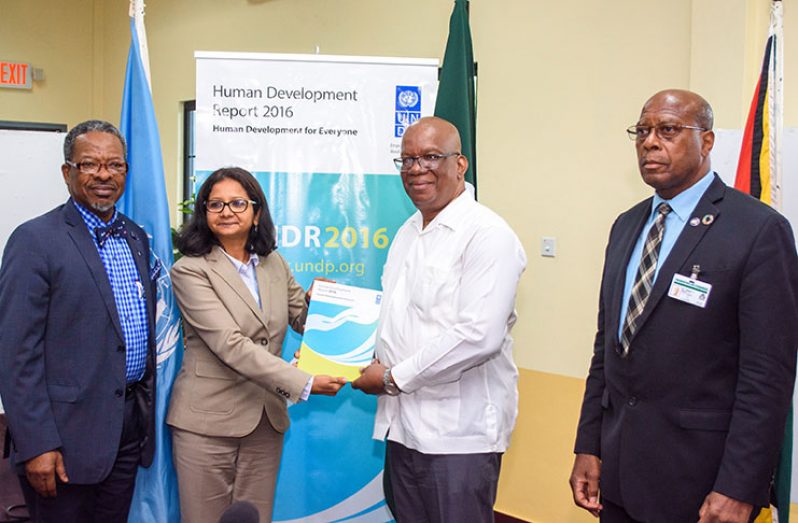FINANCE Minister, Winston Jordan, has called for a radical change in the way Guyana’s development is measured, contending that the current formula is archaic, resulting in the country losing critical development and financial support.
Out of 188 countries, Guyana has been ranked 127 and listed as a ‘Developing Country’ in the 2016 Human Development Report (HDR) produced by the United Nations Development Programme (UNDP).
Due to the country’s development level, it has now become difficult for it to access concessional resources.
The report was launched in Guyana on Wednesday at the University of Guyana, Turkeyen Campus by UNDP Deputy Resident Representative Shabnam Mallick in the presence of UNDP Programme Specialist, Dr. Patrick Chesney, the Finance Minister; and Vice-Chancellor of the University of Guyana, Dr. Ivelaw Griffith.
Other high ranking government officials were also present, along with members of the diplomatic community.
Delivering the feature address, Minister Jordan said the 2016 Human Development Report examines key issues that compromise the achievement of universalism within the existing development paradigm. However, he noted that Chapter Five – Transforming Global Institutions – has failed to address the loopholes in measuring development.
“Defining a country’s development level must not be solely driven by a one-dimensional formula, that is, the total money earned by the country divided by the total number of persons living in the country,” he stated, while pointing out that economists and development planners have long recognised the archaic and distortive effects of such a measure.
Minister Jordan said one would have hoped that by now a multi-dimensional measure would have been adopted by financial and global institutions.
QUERY
“Let me pose the following questions: Should a middle income country, like Guyana, based purely on per capita income and ranked 127 on the 2016 HDI, be considered ineligible for development partner support?
Should the Guyana be denied continued access to concessional resources because its per capita income has increased, even though significant geographical and other inequalities exist, even as the Government continues to grapple with, for example, an education system that leaves 87 per cent of our 11 year olds unable to accomplish the most basic of numeracy skills, while another 75 per cent is unable to comprehend their own language?,” he questioned.
Obviously, he said, the answer is “No”, emphasising that a single-dimension indicator should not be used to determine a country’s development level.
Nevertheless, he said Guyana will continue to champion the cause for the refashioning of the measure to one which is more appropriate, all-embracing and universally accepted.
However, he said the administration has been taking critical steps to address many of the challenges facing its people. Notably, Government has increased its allocations to the social sector with emphasis on health and education.
“We have undertaken a sweeping tax reform programme; increased real wages, including raising incomes by 38 per cent, adjusting the income tax threshold by a minimum 20 per cent, increased old age pensions and social assistance,” Minister Jordan told the launch.
BRIDGING DEVELOPMENT DIVIDE
Government, he added, is passionate about bridging the development divide between the coast and the hinterland regions, and as such, has begun to improve the road and bridge networks in the affected communities with added focus on providing equitable access to all in the field of Information and Communication Technology (ICT).
Additionally, the Government continues to work on the framework document for a Green State Development Strategy (GSDS), which will ultimately capture the national development thrust until 2030. It was the first in the Caribbean to launch the United Nations Multi-country Sustainable Development Framework and to sign its corresponding Country Implementation Plan.
“As we go forward, with the anticipation of new resources on our national horizon from oil and gas, work has advanced towards the preparation of a Sovereign Wealth Fund to ensure that the country’s natural resources are utilised in a responsible and sustainable manner, so that present and future generations can benefit,” he noted.
Meanwhile, UNDP Deputy Resident Representative, Shabnam Mallick said the 2016 Human Development Report, which was published under the theme – Human Development for Everyone, focuses on securing equitable development, explaining that it builds on the 2030 Agenda for Sustainable Development.
“Human development progress over the past 25 years has been impressive on many fronts. But the gains have not been universal. There are imbalances across countries; socioeconomic, ethnic and racial groups; urban and rural areas; women and men. Millions of people are unable to reach their full potential in life because they suffer deprivations in multiple dimensions of human development,” Mallick explained.
Zooming in on Guyana, the UNDP Deputy Resident Representative noted that the country is in the Medium Human Development Category – with a Human Development Index of 0.0638, which it has maintained since 2014.
Its latest position is at 127 out of 188 countries and territories.
CHRONIC DIFFICULTIES
“After 50 years of Independence, while we see good progress in many aspects in this country, a situation of chronic difficulties continues in three areas,” she posited, while pointing out to the country’s difficulty in transforming its natural wealth into human development; accelerating development efforts in hinterland, remote and poor areas and pursuing social inclusion and social cohesion measures.
“Natural wealth is a resource; it is the bicycle; it needs to be transformed into capabilities which can be used for advancing human development… accelerating development efforts in hinterland, remote and poor areas – this is about distribution of resources and capabilities, which, as we noted earlier, is more critical than just having resources concentrated only in certain areas,” she explained.
However, Guyana’s Finance Secretary, Dr. Hector Butts, said the Human Development Index on Guyana should be taken with a “pinch of salt”.
He explained that the index should not be seen as evaluative because of the all statistical data problems, but rather illustrative. Guyana has been taking the necessary steps to improve access to data.
The 2016 report was represented to Finance Minister Jordan and UG Vice-Chancellor, Dr. Ivelaw Griffith.




.png)









